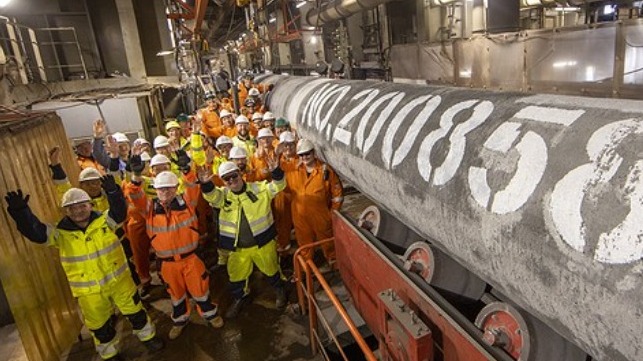Nord Stream 2's Final Pipe Section Welded Together

On Monday, specialist technicians on the Russian pipelay barge Fortuna welded together the very last pipe section of the Nord Stream 2 Pipeline.
The pipe - number 200,858 for the giant twin-pipeline project - was lowered onto the seabed in German waters of the Baltic Sea. As the next step, the section of the pipe that runs to the German shore will be connected to the section coming from Danish waters of the Baltic.
Once the last connection is finished, operator Nord Stream 2 AG will carry out pre-commissioning tasks to test and verify the system's integrity. The goal is to put the pipeline into operation before the end of this year and begin delivering Russian natural gas to German customers.
According to its sponsors, Nord Stream 2 will contribute to meeting long-term needs of the European energy market at a "sensible" price. However, the development is controversial: for the U.S. and its allies in Ukraine and Poland, it represents a geostrategic risk. The line gives Russia a new way to transport its abundant natural gas production to the European market, potentially bypassing shoreside networks in Poland and Ukraine. The Ukrainian government is increasingly concerned that Moscow will use Nord Stream 2 to cut its neighbors out of the gas transportation business, depriving Kiev of much-needed revenue. Ukraine has been engaged in a low-level conflict with Russian-backed separatist militias in its eastern Donbass region for years, and the new gas route could give Russia new leverage in border disputes.

that matters most
Get the latest maritime news delivered to your inbox daily.
For environmentalists, Nord Stream 2 opens the door to the expansion of Russia's natural gas industry, which has one of the world's highest rates of methane leakage from extraction and transportation activity. Methane is about 80 times more potent than CO2 as a greenhouse gas over a 20-year period, and climate scientists are increasingly convinced that it is a key contributor to near-term warming. “We are certain that Nord Stream 2 would not have been approved with the scientific findings now available,” says Constantin Zerger, head of energy and climate protection at Environmental Action Germany (DUH).
For Germany, the gas pipeline is an essential way to ensure adequate supplies of energy for domestic consumers and industrial users. It is also a supporting supply-side factor in Germany's drive to eliminate nuclear and coal-fired electrical powerplants. The line's completion has been a top priority for the administration of Chancellor Angela Merkel, despite strong opposition from Germany's NATO allies.
